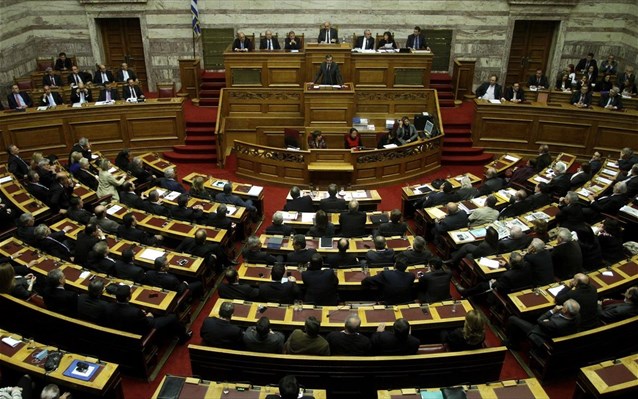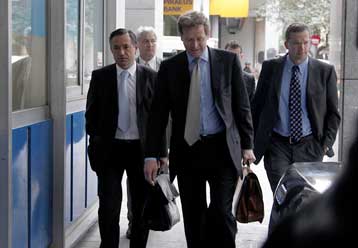Collage www.imerisia.gr
At his meeting with leaders of the four good banks, governor of the Bank of Greece George Provopoulos characterised the presence of Greek banks in Eastern Europe as very important. At the same time, he noted that in many cases, each bank has a small market share, and as a result, operates inefficiently. Therefore, he urged bankers to explore opportunities for cooperation, merger or exchange of their subsidiaries abroad.

Provopoulos insisted that measures are needed for the reduction of non-performing loans. The situation is extremely serious, since, according to information, almost 50% of mortgage loans alone are not regularly serviced. It is admitted that the number of mortgage loans that are problematic is between 500,000 and 600,000.
The number of borrowers at risk of losing their home if the auction mode is implemented is 60,000. However, the speed at which new borrowers enter the "grey" zone every day is worrying. It is estimated that about 50,000 to 60,000 loans are delayed by more than 90 days.
According to information, the creation of a centralised management of problem loans is "the antidote" suggested by Provopoulos to bankers in order to deal with this situation, which is getting more serious if you add consumer credits "in the red", as well as loans to businesses.
He advised credit institutions to reform existing directorates for delayed credits. As defined in the Memorandum, the four banks have been invited to submit further plans for the management of loans "in the red", which will indicate actions that will be taken, as well as the timetable that will be followed. The issue of operating costs was also discussed and the fact that these have marked a 20% reduction over the past five years was highlighted as progress.
Meanwhile, Parliament approved the budget for 2014 with 153 votes "for", 142 votes "against" and one abstained. Member of New Democracy Aris Spiliotopoulos was absent during the voting.

The budget was supported by all members of New Democracy and PASOK. SYRIZA MPs voted against it, as well as deputies of the Independent Greeks party, Golden Dawn, Democratic Left, the Communist Party, Independent Democratic Lawmakers and independent MP Theodora Dzakri. George Kasapidis of Independent Democratic Lawmakers abstained. Arrested members of Golden Dawn Nikos Mihaloliakos, Christos Pappas and Yiannis Lagos were absent. Spiliotopoulos sent a letter declaring that he supports the budget, but his voice was not considered valid.
Prime Minister Antonis Samaras told Parliament that this was the budget of hope, recovery and perspective.
Meanwhile, the Troika made an official announcement that the negotiation group would return to Athens in January, given that the Greek authorities are making progress in the implementation of the programme. This announcement did not surprise the Greek authorities, since the management of the Troika had warned about it. It came shortly before the vote on the budget in Parliament, despite the marked disagreement expressed by the Greek Economic headquarters on Thursday.

The truth about the situation of negotiations was described in an e-mail sent by the IMF to the other partners of the Troika. In it, the Fund warned that open "fronts" would not be closed in order to complete the evaluation of the memorandum, but new ones would be opened. The message ended with the conclusion that the implementation of the programme was constantly failing month after month. The attached table noted that under the memorandum the government had to complete 35 activities in July, but only 28 have been completed; in August - 26, of which only 15 have been fulfilled; of 47 in September – only 13; of 20 in October - only 4, and none has been completed out of 7 in November. Of the 135 activities in total, Greece has fulfilled 60 and the situation is getting worse every month.
Technocrats overseeing the implementation of the programme warned that the probability of reaching an agreement and completion of the assessment before the end of the year is minimal, despite the political will to do so not only in Athens but also in other capitals of the Eurozone. That is, there is hope for a happy ending by the end of the year only in terms of meeting the requirements for the award of the next tranche of 1 billion euro, which was approved in principle in July. Even on this front, however, EU officials warned that an agreement about government activities with respect to their commitments was not enough. The practical implementation of these commitments should be seen - something that usually takes time.
Informed sources of the Troika said that progress on all fronts was very slow. And since there were still so many open questions, it would be very bad if Greece withdrew from its already agreed commitments and in this way created new fronts. Another official source of the Troika expressed an opinion that government attempts to legislate unilaterally and without prior consultation with auditors, are perceived as a "provocation" and a practice that should be stopped, since it does not help towards the completion of the assessment.
The prevailing assessment is that although there is political will in the Eurozone for reaching an agreement as soon as possible, no one wants an agreement at any cost.